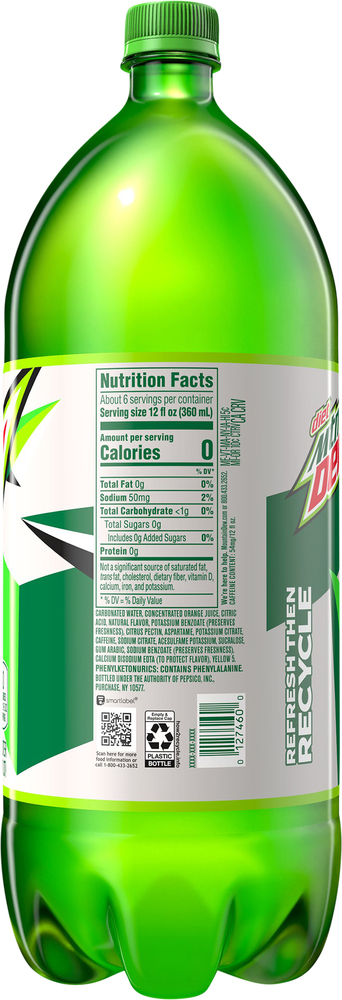Have you ever turned a can of Diet Mountain Dew in your hand, wondering what exactly goes into that fizzy delight? It’s a popular choice for many, but understanding its nutritional value can be a bit perplexing. Let’s break it down together.
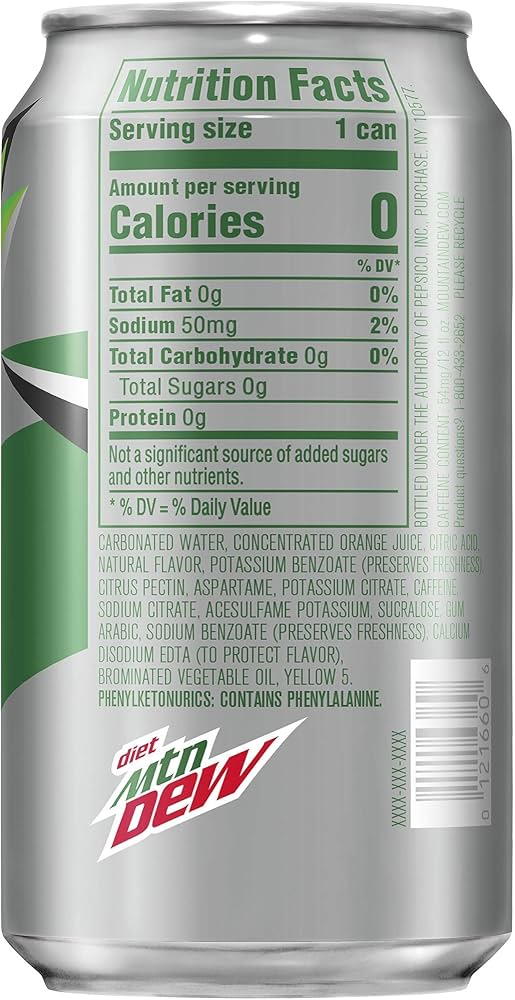
This image is property of Amazon.com.
Understanding Diet Mountain Dew
Diet Mountain Dew is a caffeine-infused soft drink that many people love for its crisp taste and diet-friendly formulation. It’s marketed as a low-calorie alternative to regular Mountain Dew, and it’s essential to know why it stands out on the beverage shelf.
One of the significant draws of Diet Mountain Dew is that it offers a sweet, citrusy flavor without the calories associated with sugary sodas. But how does it achieve this? By using artificial sweeteners, which provide the sweetness without adding calories.
Key Ingredients
Knowing the key ingredients can help you understand how Diet Mountain Dew maintains its unique flavor. Below is a brief overview of the main components:
- Carbonated water: The base of most sodas, providing the characteristic fizz.
- Natural and artificial flavors: These are crucial for that iconic taste you love.
- Caffeine: A well-known stimulant, it’s often included in sodas for the energy boost it provides.
- Aspartame and Ace-K: These artificial sweeteners keep the calorie count low while imitating the sweetness that comes from sugar.
Every ingredient serves a purpose, and understanding these can enhance your appreciation for the drink.
Nutrition Label Breakdown
When you grab a can of Diet Mountain Dew, the nutrition label can tell you a lot about what you’re drinking. Let’s take a detailed look at the nutrition facts typically found on the can.
Calories
If you check the nutrition label, you’ll notice that a standard 12-ounce serving of Diet Mountain Dew contains 0 calories. This makes it an appealing option for those monitoring their caloric intake.
Sugars
One of the most significant attractions of Diet Mountain Dew is its sugar content: 0 grams. This is possible due to the presence of artificial sweeteners instead of traditional sugars.
Sodium
The sodium content in Diet Mountain Dew is relatively low, around 65 milligrams per 12 ounces. This can be beneficial for those who are watching their sodium intake for health reasons.
Caffeine Content
It’s important to be mindful of caffeine, especially if you’re sensitive to it. A standard 12-ounce serving of Diet Mountain Dew contains approximately 54 milligrams of caffeine. This amount is comparable to many other soft drinks, providing a moderate boost without overdoing it.
Other Nutrients
Diet Mountain Dew doesn’t provide significant amounts of vitamins or minerals, as it mainly serves as a flavored beverage. It’s low in nutrients, so it’s important not to rely on it for nutritional benefits.
Artificial Sweeteners: The Good and The Bad
You might have some lingering questions about the sweeteners used in Diet Mountain Dew. Here’s a breakdown of aspartame and Ace-K, which are the primary artificial sweeteners.
Aspartame
Aspartame is one of the most popular artificial sweeteners. It’s about 200 times sweeter than sugar, which means a small amount goes a long way. It has been the subject of numerous studies, and regulatory bodies, including the FDA, have deemed it safe for consumption.
However, some individuals have reported sensitivity to aspartame, experiencing headaches or other symptoms. It’s important to pay attention to how your body reacts if you consume products containing it.
Ace-K (Acesulfame Potassium)
Ace-K is another artificial sweetener that is often used in conjunction with aspartame to provide a more balanced sweetness. This sweetener has also been approved by regulatory agencies. While it’s generally considered safe, some studies suggest that it may have effects on metabolic processes, although further research is necessary.
Many consumers appreciate the taste of these sweeteners, but understanding their potential effects on your body is always prudent.
The Impact of Caffeine
Caffeine is a staple in many soda formulations, including Diet Mountain Dew. It can have both positive and negative effects on your body.
Positive Effects
- Increased Alertness: Caffeine is known for its ability to increase alertness and energy levels, making it a popular choice in the morning or during a mid-afternoon slump.
- Enhanced Physical Performance: Some studies indicate that caffeine may improve performance in endurance sports, making it a favorite for athletes.
Negative Effects
- Jitters or Anxiety: For some, consuming caffeine can lead to feelings of jitteriness or increased anxiety, particularly if consumed in larger quantities.
- Sleep Disruption: Consuming caffeine too close to bedtime can interfere with sleep quality, so it’s wise to pay attention to when you indulge.
Understanding your body’s tolerance to caffeine can help you decide how much Diet Mountain Dew—or any caffeinated drink—is right for you.
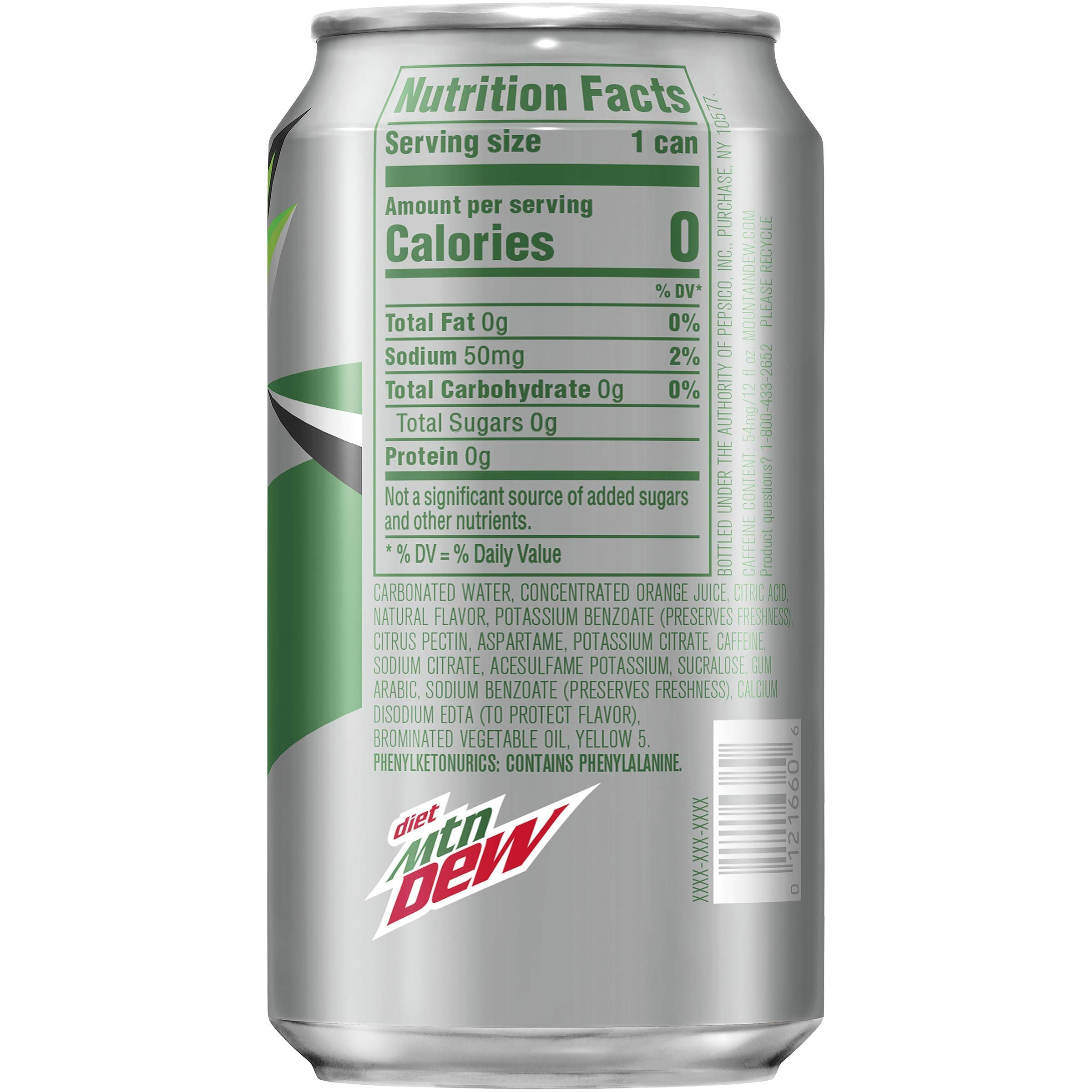
This image is property of Amazon.com.
Health Considerations When Drinking Diet Mountain Dew
While Diet Mountain Dew can be an enjoyable part of your beverage choices, it’s also essential to consider how it fits into your overall diet. Moderation is key in any healthy lifestyle.
Weight Management
As a zero-calorie drink, Diet Mountain Dew can be a tool for weight management. It provides the flavor of soda without the calories, which may help satisfy your cravings without derailing your diet. However, relying too heavily on diet sodas can lead to cravings for sweet foods, so balance is crucial.
Dental Health
Sodas, even diet ones, can still be highly acidic. While they don’t contain sugar that contributes to cavities, the acidity can still erode tooth enamel over time. If you enjoy Diet Mountain Dew, consider rinsing your mouth with water afterward to help reduce acidity exposure.
Hydration
It’s important not to consider Diet Mountain Dew a substitute for water. While it can contribute to your fluid intake, it’s best to prioritize water for hydration. A well-balanced diet should include a variety of beverages, including plain water as the main source of hydration.
Comparing Diet Mountain Dew with Other Beverages
You might find it helpful to compare Diet Mountain Dew with both regular Mountain Dew and other popular diet sodas. Here’s a brief look at how they stack up.
Regular Mountain Dew vs. Diet Mountain Dew
| Nutritional Element | Regular Mountain Dew (12 oz) | Diet Mountain Dew (12 oz) |
|---|---|---|
| Calories | 170 | 0 |
| Sugars | 46 grams | 0 grams |
| Caffeine | 54 milligrams | 54 milligrams |
Regular Mountain Dew provides a significant amount of sugar and calories, which can lead to weight gain if consumed excessively. In contrast, Diet Mountain Dew offers a calorie-free alternative.
How Does it Compare to Other Diet Sodas?
When considering other diet sodas, you might find the following similarities and differences. Here’s a generalized comparison of a few popular diet sodas:
| Beverage | Calories (12 oz) | Sugar (12 oz) | Caffeine (12 oz) |
|---|---|---|---|
| Diet Mountain Dew | 0 | 0 | 54 mg |
| Diet Coke | 0 | 0 | 46 mg |
| Diet Dr Pepper | 0 | 0 | 41 mg |
As you can see, many diet sodas are similar in terms of calorie and sugar content, but there are slight differences in caffeine levels. Selecting the right one often comes down to personal preference in taste.
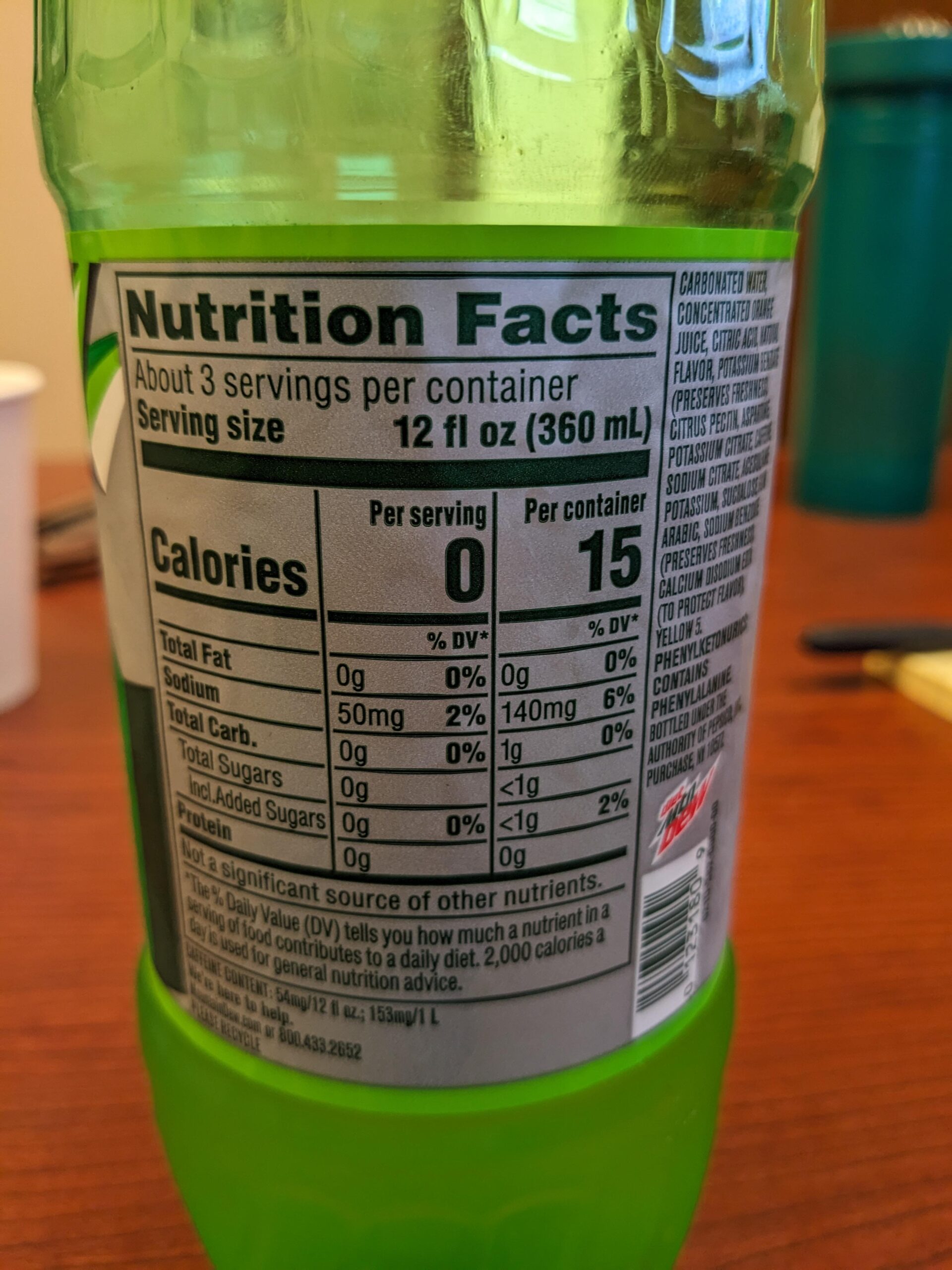
This image is property of i.redd.it.
Lifestyle Choices and Diet Mountain Dew
If you enjoy drinking Diet Mountain Dew, incorporating it into an overall balanced diet is essential. Here are some tips on how to enjoy it mindfully without compromising your health goals.
Moderation is Key
Enjoying Diet Mountain Dew occasionally can be a refreshing treat. However, consuming too much can have its downsides. Aim to limit your intake and balance it out with nutrient-rich foods and hydrating beverages.
Be Mindful of the Effects
If you notice that consuming Diet Mountain Dew leads to cravings for sweets or affects your sleep, consider reducing the amount. Everybody’s body reacts differently, and listening to yours is vital.
Consider Your Diet Holistically
Remember to view your overall diet as a whole. While Diet Mountain Dew can fit in, make sure you’re also consuming plenty of whole foods, fruits, vegetables, and water. A balanced lifestyle is the key to maintaining health.
Conclusion: Making Informed Choices
It’s easy to grab a Diet Mountain Dew when you’re in the mood for something crisp and refreshing. However, being informed about what you’re consuming helps you make better choices for your health and well-being.
Diet Mountain Dew stands out as a zero-calorie, sugar-free option that can quench your thirst. But remembering to drink it in moderation among a variety of nutritious foods and beverages is crucial. With knowledge about its nutritional values, ingredients, and effects, you can enjoy your soda guilt-free while staying mindful of your overall dietary habits.
Ultimately, you have the power to make choices that align with your health goals. So, the next time you’re at the store, and Diet Mountain Dew catches your eye, you’ll know exactly what’s inside that bright can. Enjoy it—but always with a thoughtful approach to balance and health.
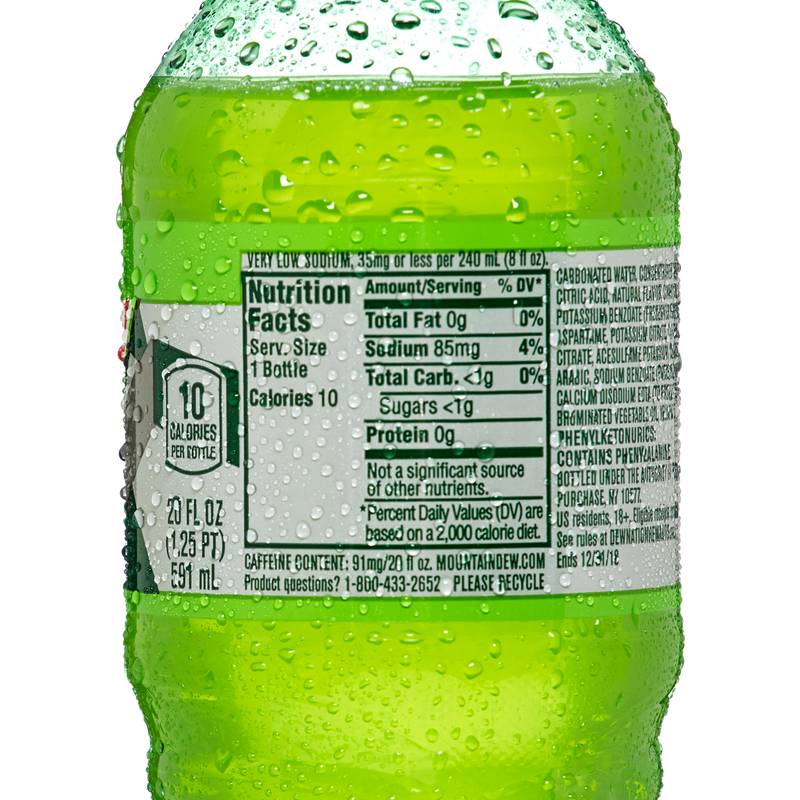
This image is property of arizona.bevmo.com.
